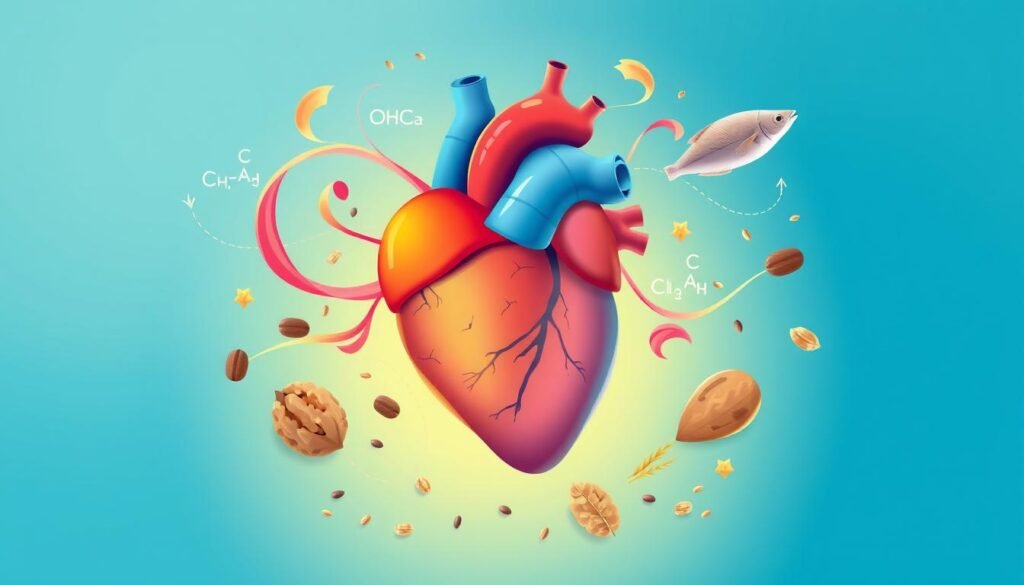Omega-3 fatty acids are very important for our heart and brain. They are needed for the cells to work well. This is true for all ages. They help make the outer part of cells, affecting brain and heart health. Eating Omega-3s regularly can lower bad fat in your blood. This lowers heart disease and stroke risks1. Omega-3s are also good for our mental health and brain growth1.
Eating Omega-3s from foods like fish, flaxseeds, and walnuts is the best1. But, talking to a doctor about how much Omega-3 you need is. This ensures you get the full benefits of these important nutrients1.
Key Takeaways
- Omega-3 fatty acids are essential for heart and brain health at all life stages
- They help lower triglyceride levels, reducing the risk of heart diseases and stroke
- Omega-3s play a significant role in brain function and development
- Consuming Omega-3s through fish and plant-based sources is generally preferred
- Consulting a healthcare provider is advisable for personalized Omega-3 intake recommendations
Understanding Omega-3 Fatty Acids and Their Types
Let’s talk about Omega-3 fatty acids. We mainly find them in three types: ALA, DHA, and EPA. Each one is unique and helps our health in different ways.
Types of Omega-3 Fatty Acids
There are three main Omega-3s: ALA, DHA, and EPA2. ALA is in foods like flax seeds, chia seeds, and walnuts2. EPA and DHA come mostly from fish and fish oil. DHA is also in meat, eggs, and dairy from animals that eat grass2. Our bodies don’t easily change ALA into EPA and DHA. So, eating foods with EPA and DHA is important.
Keeping a good balance between omega-6 and omega-3 is key for health2. DHA is very important for babies’ brain growth. So, moms who are pregnant or breastfeeding need to get enough of it2. EPA and DHA can also help protect against diseases like breast cancer, depression, ADHD, and inflammation2. Always talk to a doctor for advice. For more info, see this on health questions.
Sources of Omega-3s
Fish like salmon, herring, sardines, and trout have lots of EPA and DHA3. They also have less mercury. People with heart disease should eat about 1 gram of EPA and DHA each day, from fish3. For ALA, a tablespoon of flaxseed oil has 7.3 grams4. And a half-cup of walnuts gives you 1.7 grams of ALA and other goodies like fiber and vitamin E4.
Adults in the US should eat at least eight ounces of seafood a week. That gives them about 250 mg of EPA and DHA every day4. Eating fish one to four times a week lowers the risk of heart disease4. Omega-3’s can also lower fat in the blood, helping the heart stay healthy4.
| Omega-3 Type | Common Sources |
|---|---|
| ALA (Alpha-linolenic acid) | Flax seeds, chia seeds, walnuts, flaxseed oil2 |
| EPA (Eicosapentaenoic acid) | Fatty fish, fish oil, microalgae2 |
| DHA (Docosahexaenoic acid) | Fatty fish, fish oil, meat, eggs, dairy from grass-fed animals2 |
Omega-3 Supplements: A Convenient Source
These supplements are a handy choice for those not getting enough from food. They are great for your heart and brain. Knowing their benefits and how to choose is important for your health.
Benefits of Omega-3 Supplements
Omega-3s are more than just nutrients. They help reduce inflammation and keep your brain working well. They ease joint pain and help with mood swings and anxiety5.
Choosing the Best Omega-3 Supplements
Look for supplements high in EPA and DHA. Fish oil has about 180 mg of EPA and 120 mg of DHA per 1000 mg6. Pick capsules that are checked for purity6.
If you want a plant-based choice, try algal oil from algae which is good for the planet6. Krill oil has antioxidants that protect it from going bad6. Make sure your choice is tested for purity and good for the environment.
Omega-3s also cut heart disease risk by managing triglycerides with supplements5. Talk to a doctor before trying any new supplement.
Heart Health Benefits of Omega-3s
Omega-3 fatty acids are great for your heart. They have been studied a lot. These good fats can lower the risk of heart problems.

Studies and Evidence
The Centers for Disease Control and Prevention say fish oil capsules are popular. They are rich in Omega-3s. Adults over 60 use them a lot7.
In the VITAL trial, nearly 26,000 older adults joined. They had no heart disease before. Eating more Omega-3s lowered heart disease events by 19%7. Also, Omega-3 supplements cut heart attacks by 28%7.
People who don’t eat much fish had 40% fewer heart attacks with Omega-3s7. If you have heart risks like smoking, Omega-3s can cut heart attacks by 44%7. African Americans saw a huge drop in heart attacks – 77%7. The REDUCE-IT trial confirmed these benefits. It showed a 25% lower risk of heart issues over five years7.
Preventing Heart Disease
It’s important to get the right amount of Omega-3. The American Heart Association says eat fatty fish like salmon twice a week. This lowers your heart disease risk and keeps your heart healthy.
Eat plants with Omega-3s too, like flaxseeds and walnuts. Pregnant women and kids should choose low-mercury fish. Eating fish helps your heart more than just taking supplements does8.
You might need different amounts of Omega-3 based on your health and diet. Seafood and plant foods help your heart. Supplements can also help. Learn more about promoting heart health with Omega-37.
Brain Health Benefits of Omega-3s
Omega-3 fatty acids are key for a healthy brain and better memory. They make brain cells work better. This helps neurons talk to each other and boosts brain function. Studies prove that DHA, an omega-3, improves learning scores with fewer mistakes in people taking 900 mg/day for 24 weeks9.
Omega-3s also help with thinking skills and keeping the brain healthy in adults10. Those with more omega-3s have bigger memory-related brain areas10.

Research on 174 articles showed omega-3s boost memory and brain skills, especially when cognitive decline starts9. The studies mostly involved people around 45 years old. This shows omega-3s are useful for many ages9. Even small amounts of omega-3s have a big impact on brain health10.
To learn more about how omega-3s help the brain, check out this blog.
Table 1: Overview of Omega-3 Brain Health Benefits
| Benefit | Supporting Data |
|---|---|
| Enhanced Memory | Higher PAL scores with DHA supplementation9 |
| Better Abstract Reasoning | Improved reasoning abilities with omega-3 intake10 |
| Larger Hippocampal Volume | Higher omega-3 levels linked to larger hippocampal volumes10 |
| Improved Brain Cell Communication | Enhanced neuron communication with omega-3s10 |
| Reduced Cognitive Decline | Slower cognitive decline in early stages with omega-3s9 |
Adding omega-3s to your diet can greatly help your brain and memory. Foods or supplements rich in omega-3 fatty acids are great for brain health.
Conclusion
Omega-3 fatty acids are key for keeping our hearts and brains healthy. They are important at all stages of life. Adding omega-3-rich foods, like fish, to our meals can offer big health benefits. These include lower risks of strokes and heart problems.
For instance, consuming 850 mg/day of EPA and DHA omega-3s with vitamin E can cut stroke and heart failure risks11. Eating fish regularly may also reduce heart disease risk. People who eat fish twice a week face lower risks11. These facts show how crucial our diets are for our health.
Omega-3 supplements can be an easy choice, but their effectiveness is not always clear. It’s important to be careful with these findings. The FDA says up to 3g/day of EPA plus DHA omega-3s is safe12. But, talking to a doctor before starting supplements is a must for the best health results.
Getting enough omega-3s, from diet or pills, is key. These fats help our hearts, brains, and blood flow. They might even lower the risk of diseases like arthritis or cancer1112. Making Omega-3s part of your everyday eating can boost your mental and physical health.
Source Links
- How Omega-3 Fish Oil Affects Your Brain and Mental Health – https://www.healthline.com/nutrition/omega-3-fish-oil-for-brain-health
- What Are Omega-3 Fatty Acids? Explained in Simple Terms – https://www.healthline.com/nutrition/what-are-omega-3-fatty-acids
- Office of Dietary Supplements – Omega-3 Fatty Acids – https://ods.od.nih.gov/factsheets/Omega3FattyAcids-Consumer/
- Top 3 Sources of Omega-3 Fatty Acids and Why They’re Important – Virtual and in-person musculoskeletal healthcare | Vori Health – https://www.vorihealth.com/resource/top-3-sources-of-omega-3-fatty-acids-and-why-theyre-important
- Meditation and Mindfulness for Stress Management: A Natural Path to Inner Peace – https://carencia.com/blog/natures-healing-touch-the-power-of-omega-3-fatty-acids-in-combating-depression-and-anxiety/
- Omega-3 Supplement Guide: What to Buy and Why – https://www.healthline.com/nutrition/omega-3-supplement-guide
- Omega-3s for heart health? Exploring potential benefits and risks – https://www.nhlbi.nih.gov/news/2024/omega-3s-heart-health-exploring-potential-benefits-and-risks
- How eating fish helps your heart – https://www.mayoclinic.org/diseases-conditions/heart-disease/in-depth/omega-3/art-20045614
- Effects of Omega-3 Polyunsaturated Fatty Acids on Brain Functions: A Systematic Review – https://pmc.ncbi.nlm.nih.gov/articles/PMC9641984/
- Study links omega-3s to improved brain structure, cognition at midlife – UT Health San Antonio – https://news.uthscsa.edu/study-links-omega-3s-to-improved-brain-structure-cognition-at-midlife/
- OMEGA 3 – Health Benefits of Nutrition – http://www.medparkhospital.com/en-US/lifestyles/omega-3-health-benefits-of-nutrition
- Omega-3 Fatty Acids—Science, Efficacy, and Clinical Use in Cardiology – https://www.uscjournal.com/articles/omega-3-fatty-acids-science-efficacy-and-clinical-use-cardiology
